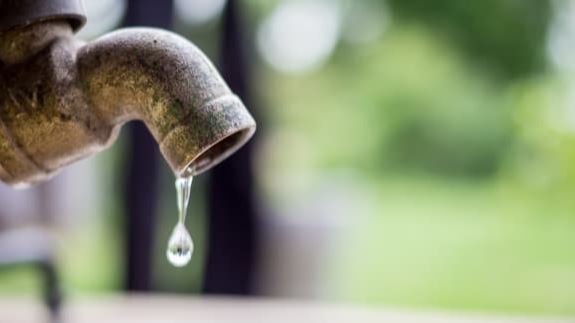Water levels remain low in Rarotonga
Friday 19 August 2022 | Written by Matthew Littlewood | Published in National, Weather

Water drips from a tap. Photo: SUPPLIED/RNZ
Cook Islands water authorities are still asking people to conserve water use despite the recent downpour.
Met Services director Arona Ngari said although there were heavy winds, there was only about 15 millimetres of rain recorded over the past two days.
“We need about 10 times that to return back to normal, and we’re just not likely to see it,” Ngari said.
“The chances of a significant deluge happening soon are very slim, we’re still in the La Nina stage, and rainfall is about 50 to 60 per cent of normal.”
Ngari urged all water consumers to be careful, and not waste water unnecessarily.
“We’ve still got a long way to go,” he said.
Walter Tuarae-White, of To Tatou Vai, said: “We will not be lifting the conservation messages and still urge everybody to conserve water. Despite the recent rain we’ve just had.”
“It’s only a slight relief because it’s been so dry, the ground water table needs to refill to enable the streams to run in excess of the water we are taking out,” Tuarae-White said.
“We are currently capturing all of the stream water for the Islands supply with some intakes at below 50 per cent even after this run of wet weather. So, we still urge the community to conserve water.”
Hotels and accommodation operators have been asked not to fill swimming pools, ponds, use water blasters to clean homes, cars and hard surfaces or use water for non-essential purposes.
Cook Islands Tourism Industry Council president, Liana Scott, told Radio New Zealand that a drought is not out of the ordinary.
“I think a couple of months is quite common and it’s not to say we’ll have no drop of rainfall, we’ll have some short showers but probably not enough to fill up the water mains,” Scott said.
“If it gets really bad, unfortunately, it’s the higher level housing or accommodation that feels it the most due to gravity so the ones on the foreshore will be less impacted than the ones in the highland area.
“You know when it’s getting bad when you see a Facebook post about people having to top up their water using their truck. It requires funding so that becomes an extensive exercise to be topping up regularly.”




































